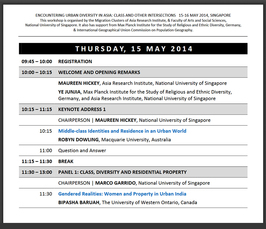"Encountering Urban Diversity in Asia: Class and Other Intersections"
Workshops, conferences 2014
- Start: May 15, 2014 09:45 AM (Local Time Germany)
- End: May 16, 2014 05:30 PM
- Location: Asia Research Institute, National University of Singapore
- Room: Seminar Room Tower Block Level 10

For more details please contact esser(at)mmg.mpg.de.
Contact Person: Sharon ONG
The unprecedented pace and scale of economic, political, social and demographic change in Asia in recent decades has brought about an increase in levels of population mobility, the complexity of their spatial patterning, and the diversity of the groups involved. While the primary source of newcomers into cities are low and high end labour migrants, other newcomers, such as marriage and student migrants, together with emerging subcultures and complex socio-economic shifts within already established ethnic and religious communities, are also contributing to growing social diversity. Within this context, spaces such as schools, workplaces, transit places, community events and food centers become sites where people of different backgrounds and distinct identities based on social differentiation must co-exist and interact with others.
In recent years a growing body of literature has sought to document and analyse these emerging constellations of difference and encounter in the everyday spaces and places of global cities. Much of this work has focused on the implications on growing cultural diversity and interactive, prosaic negotiations that have resulted from increased migration flows. Yet the ways in which these flows are producing new forms of intersecting social and economic class relations across city, national and transnational scales has, up to this point, received less attention. As feminist scholars have illustrated, class, in conjunction with gender, nationality, sexuality, race and ethnicity, are also crucial ways through which people experience social life, which is always embedded within material conditions and power. We explore and question the possibilities of changing social relations within these configurations of diversity by taking into account the structural factors and material constraints which shape and could potentially be shaped by these forms of co-existence. One purpose of this conference is to bring together scholars interested in rethinking and retheorising the production and performance of class relations in an era of growing transnational mobility and urban diversity in non-Western contexts. With an eye towards further unsettling understandings of economic class categories and relations), the organizers are particularly interested in fostering an expanded conversation on the ways in which economic and social categories of class produce, inform, complement and contradict one another within the urban contact zones of the region.